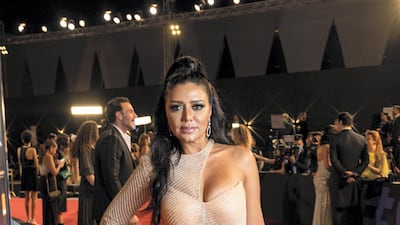An Egyptian court on Sunday acquitted actress Rania Youssef of indecent behaviour in public, corruption, contempt of religion, and making false statements in a controversial TV interview this year.
The Qasr Al Nil Court of Misdemeanours decided to postpone until February 28 another lawsuit against Youssef for comments she made about the hijab during the same interview, which were criticised as disrespectful to Islam.
Youssef, 47, took part in the interview in January, after which two prominent lawyers brought the lawsuits against her.
Ashraf Farahat and Ashraf Nagy publicly decried her comments in the interview broadcast on Iraqi satellite TV channel Al Rasheed, in which she discussed her controversial career with host Nizar Al Faris.
After the court’s ruling, Youssef posted a tweet celebrating her acquittal and thanked the Egyptian judiciary for being “the patron of rights and freedoms in Egypt”.
Her lawyer, Tarek El Awady, also posted a celebratory tweet announcing her innocence on Sunday. The National reached out to El Awady for comment on the verdict, but he declined.
In the interview, Youssef said Muslim women should not be made to wear the hijab in Egypt.
She told Al Faris that Islam did not mandate it and that it had been imposed on Egyptian culture, which she said did not include wearing the hijab until the 1970s.
Youssef claimed the wives of many Azhar scholars were not required to wear the hijab until a few decades ago.
“Hijab has nothing to do with covering a woman up, since most women don’t walk around the streets in beachwear," she said.
"There are other ways to cover a woman up."
Youssef also said how much she loved her body, and that this was why she made a habit of dressing provocatively, for which she had previously been criticised by Egyptian viewers.
She also used a Quranic verse to get her point across, offending many viewers.
After the social media storm from the interview, Youssef publicly attacked Al Faris, accusing him of presenting her comments out of context.
She said Al Faris cut out snippets from the full-length interview, making what she said sound more inflammatory than it was.
This month, Youssef announced on social media that she decided to take legal action against Al Faris, his show and Al Rasheed for the portrayal of her comments.
She claimed that throughout the interview, Al Faris asked her "blatantly insensitive" questions.
She said she deflected the questions in an exaggeratedly comedic way, which is an old industry trick to deal with disrespectful interviewers.
“It is customary that every profession has a strict and clear code of conduct that regulates it, but it is also known that every profession has a human honour code," Youssef wrote.
"The honour code is considered as the shadow of the law and the media honour code obliges media workers to respect their guests, especially if they are famous people."
In response to her lawsuit, Al Faris posted a video on social media, rejecting her claims that he acted dishonestly.
“You said what you said, I only asked you questions," he said. "You got yourself in trouble by yourself, with your own words.”
Al Faris promised that he would post recorded proof that Youssef was entirely happy with her interview in the end.
He claimed that he had behind-the-scenes footage of her expressing her gratitude for how he conducted the interview, and saying she was impressed with his questions.
Al Faris this month said he was filing for defamation against Youssef.
In 2018, she caused a stir with a see-through dress she wore at the Cairo International Film Festival, which catapulted her into the public eye.
Then in 2020, Youssef was ridiculed for comments she made about the Covid-19 pandemic.
"Humans defeated the dinosaurs and they can defeat corona," she said.


